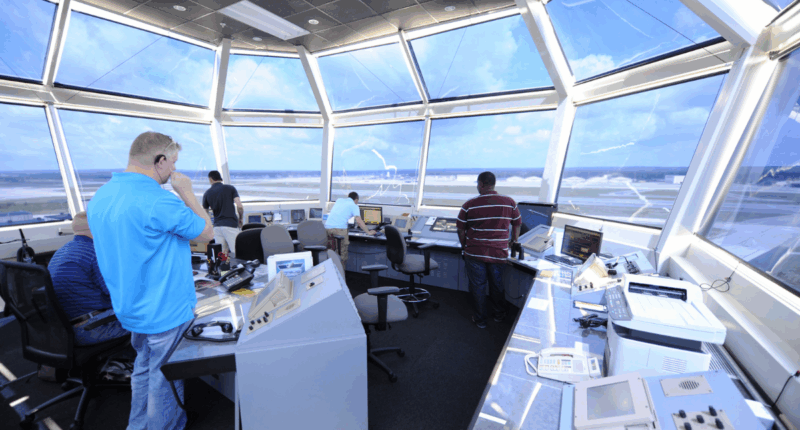As the government shutdown ends, so hopefully will the crisis at our airports. Air traffic controllers, deemed “essential” but forced to work without pay, called in sick, and our national aviation system’s fragility was on display.
This predictable chaos is both a political and structural failure. And it has a clear solution: Get the federal government out of the air traffic control business. The airlines — the primary commercial beneficiaries of this essential service — should pay the controllers’ salaries.
The current model, where taxpayers fund the entire Federal Aviation Administration’s air traffic control system, obscures a simple truth. The most direct beneficiaries of a safe aviation system are the commercial airlines, whose entire business model depends on the controllers’ unseen, high-stakes work. The “public” benefit is captured almost entirely by the airlines’ own customers.
In most commercial sectors, we recognize that those who consume a service should pay for it directly: Package delivery is not financed through general tax revenues; UPS and FedEx customers pay when they ship. Rental car fleets are not federally funded; drivers pay when they rent. Air traffic control should be no different. When costs are socialized but benefits are concentrated, one should not be surprised at the political gamesmanship and underinvestment that now plague the system.
There is no fundamental reason that air traffic control must be a federal government function. The airlines can employ these controllers just as easily as the government does. Private firms manage systems of staggering complexity: global logistics networks, real-time financial markets, and just-in-time supply chains that span the planet. Unlike a tax-funded model, all of these systems must be responsive to their users.
Similarly, air traffic control could be managed through a federally chartered nonprofit entity, funded by user fees paid by the airlines. This is not a radical idea; Canada successfully privatized its air navigation system, NAV CANADA, two decades ago. That nonprofit corporation became a global leader in safety, technology, and efficiency, all without relying on government appropriations.
Adopting this model would allow air traffic control to run like a business rather than a bureaucracy. Like NAV CANADA, a private entity could raise its own capital for technology and infrastructure upgrades, avoiding the congressional funding delays and bureaucratic inertia that have plagued the FAA’s NextGen modernization program. Severing the link to the political appropriations process would enable the system to invest in new technologies that enhance safety and efficiency. Such tools could, for example, support more direct routing, saving fuel and passenger time.
The most immediate benefit would be insulating our national transportation network from political dysfunction. Controllers would no longer be hostages in legislative budget battles. Their salaries would be paid by the airlines that rely on their labor, not by a fickle Congress that cannot, or will not, pass a funding bill. Markets separate day-to-day operations from partisan bickering. Airlines, who pay directly for the service, can demand cost-effectiveness and performance in a way that politicians and government agencies never do.
Furthermore, this move would streamline a massive government bureaucracy. It creates a more direct and logical connection between those paying for the service and those providing it. The airlines, as funders, would have a direct stake in ensuring that the system is efficient, modern, and well-staffed. This direct accountability is a powerful incentive for innovation — something the FAA’s modernization efforts have often lacked.
One might object that this change would simply pass the cost on to travelers. That is true, but travelers already pay — through federal taxes that fund the FAA and, more acutely, in lost time, missed connections, and canceled plans every time Washington’s gridlock shutters the government.
At the moment, millions of taxpayers pay whether they fly frequently, occasionally, or never, and the cost is imposed in ways difficult to discern and hidden in the greater cost of the shutdown. Imposing a transparent fee to guarantee that a controller guiding the plane is paid and present is a more honest and efficient system. If it saves airlines money on fuel and reduces delays, as the Canadian model has proven it can, the market forces will eventually compel them to pass those savings onto consumers.
Finally, there is the effect on the air traffic controllers, who are at the mercy of government dysfunction. They want to work. We want them to work. But they are forced to choose between eating and enabling air travel whenever partisans in Washington fight.
This is no way to run a critical piece of national infrastructure, and it treats the controllers as political leverage. A user-funded, privately run system would treat controllers as valued professionals. Their compensation could be tied to performance and experience. Higher wages could attract experience and talent to busier locations with more complex operations, resulting in a safer flying experience. A competitive labor market would accurately value controllers’ specialized skills, not bury them inside a rigid government pay scale.
George A. Mocsary is a professor of law at the University of Wyoming College of Law. His scholarship focuses on law and economics, business law, and firearms law.









